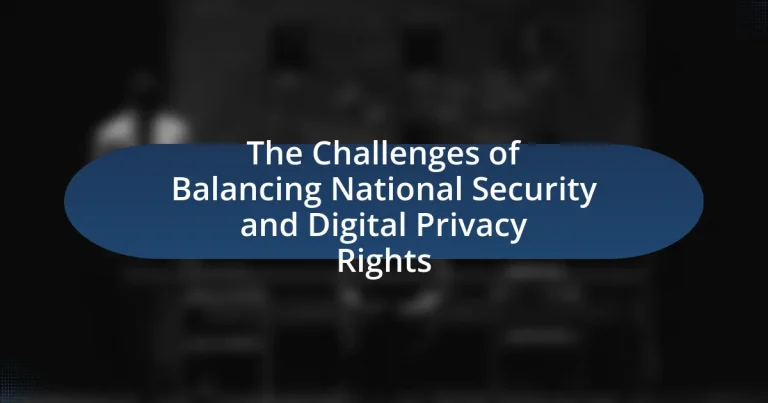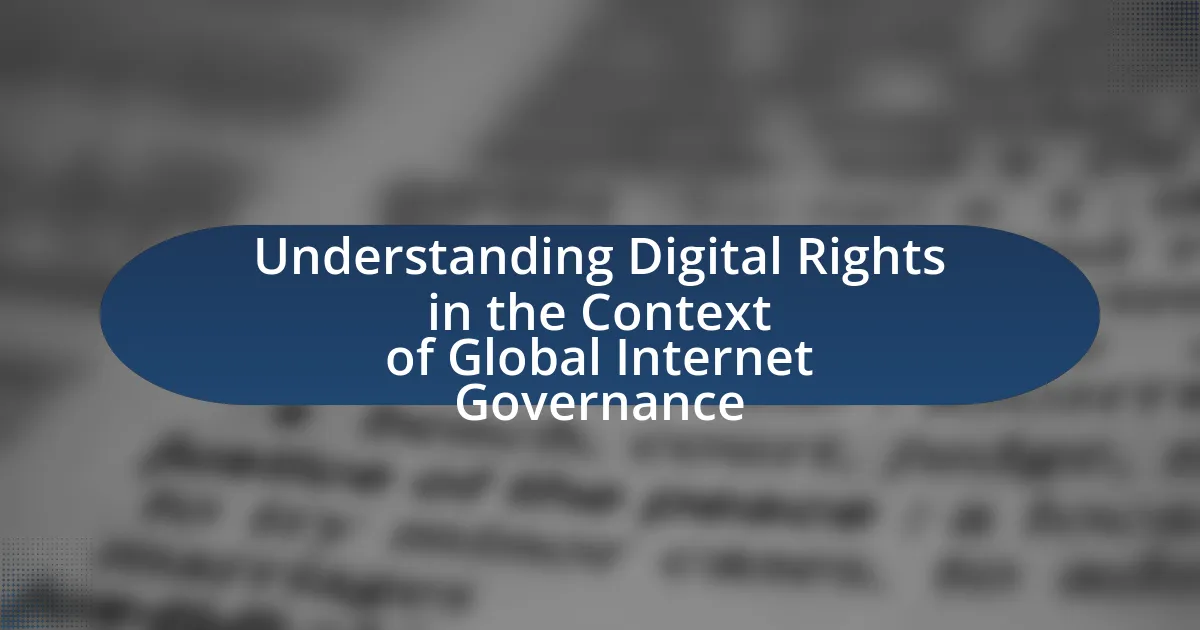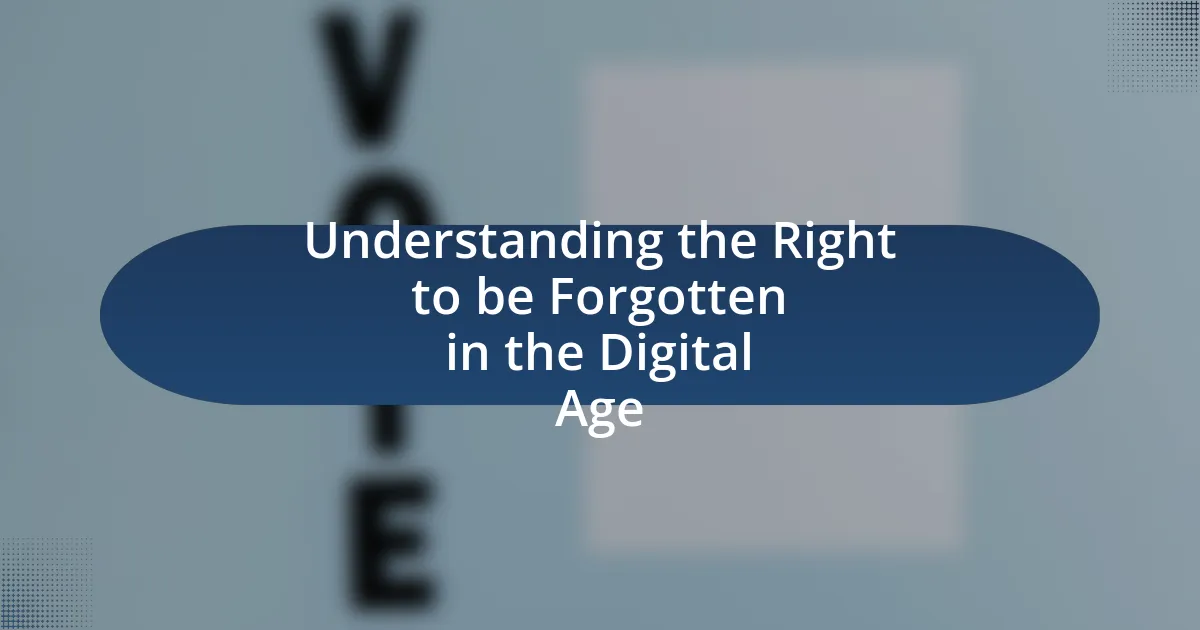The article examines the challenges of balancing national security and digital privacy rights, highlighting issues such as government overreach, the complexity of legal frameworks, and the rapid advancement of technology. It discusses how national security concerns justify increased surveillance, often leading to the erosion of individual privacy rights, as seen in legislation like the USA PATRIOT Act. The article also explores specific threats that necessitate surveillance, the implications of prioritizing security over privacy, and the varying legal frameworks across different countries. Additionally, it addresses the role of technology in enhancing both security and privacy, best practices for governments, and the importance of civil society organizations in advocating for privacy rights.
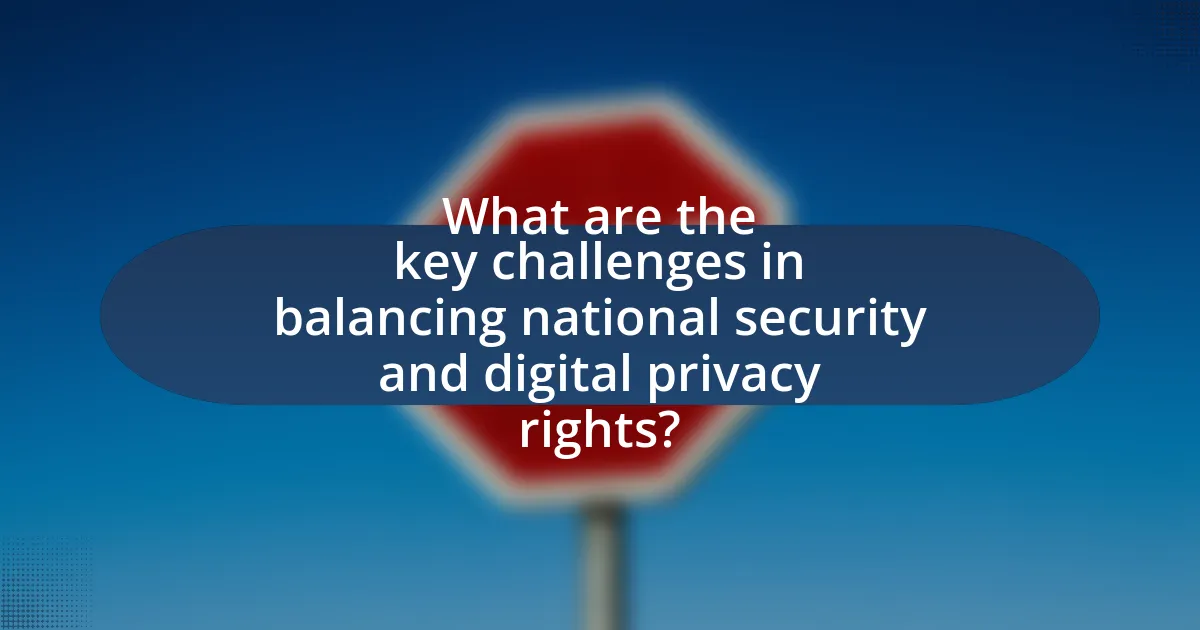
What are the key challenges in balancing national security and digital privacy rights?
The key challenges in balancing national security and digital privacy rights include the potential for government overreach, the difficulty in establishing clear legal frameworks, and the rapid evolution of technology. Government overreach occurs when national security measures infringe upon individual privacy rights, leading to public distrust and resistance. Establishing clear legal frameworks is challenging due to the varying interpretations of privacy rights and national security needs across different jurisdictions. Additionally, the rapid evolution of technology complicates the situation, as new tools for surveillance and data collection can outpace existing regulations, making it difficult to protect citizens’ privacy while ensuring national security. For instance, the USA PATRIOT Act, enacted after the September 11 attacks, expanded surveillance capabilities but raised significant concerns about privacy violations.
How do national security concerns impact digital privacy rights?
National security concerns significantly impact digital privacy rights by justifying increased surveillance and data collection practices. Governments often enact laws that allow for the monitoring of online activities under the premise of protecting national security, which can lead to the erosion of individual privacy rights. For example, the USA PATRIOT Act, enacted after the September 11 attacks, expanded the government’s ability to conduct surveillance and access personal data without a warrant, demonstrating a direct conflict between national security measures and the protection of digital privacy. This trend is evident globally, as many countries implement similar policies that prioritize security over privacy, often resulting in public debate and legal challenges regarding the extent of surveillance and its implications for civil liberties.
What specific threats to national security necessitate surveillance?
Terrorism, cyber threats, espionage, and organized crime are specific threats to national security that necessitate surveillance. Terrorism poses a risk through planned attacks on civilians, as evidenced by incidents like the September 11 attacks, which prompted increased surveillance measures to prevent future occurrences. Cyber threats, including hacking and data breaches, can compromise national infrastructure and security, highlighted by the 2016 U.S. election interference. Espionage involves foreign entities gathering sensitive information, which can undermine national interests, as seen in cases involving state-sponsored hacking. Organized crime networks exploit vulnerabilities, threatening public safety and economic stability, necessitating surveillance to disrupt their activities.
How do these threats influence government policies on privacy?
Threats to national security significantly influence government policies on privacy by prompting stricter regulations and surveillance measures. Governments often justify increased data collection and monitoring as necessary for protecting citizens from terrorism and cyberattacks. For instance, the USA PATRIOT Act, enacted after the September 11 attacks, expanded the government’s surveillance capabilities, illustrating how perceived threats can lead to diminished privacy rights. Additionally, ongoing cyber threats have led to policies that require companies to enhance data security and report breaches, further intertwining national security concerns with privacy regulations.
What are the implications of prioritizing national security over digital privacy?
Prioritizing national security over digital privacy can lead to significant erosion of individual freedoms and civil liberties. When governments implement extensive surveillance measures in the name of security, they often justify the infringement on personal privacy rights, which can result in a culture of mistrust among citizens. For instance, the USA PATRIOT Act, enacted after the September 11 attacks, expanded government surveillance capabilities, leading to widespread monitoring of communications without warrants. This shift can also create a chilling effect on free speech, as individuals may self-censor due to fear of being monitored. Furthermore, prioritizing security can lead to the normalization of invasive technologies, such as facial recognition and data collection, which can be misused for purposes beyond national security, including discrimination and social control.
How does increased surveillance affect individual freedoms?
Increased surveillance significantly restricts individual freedoms by enabling the government and organizations to monitor personal activities and communications without consent. This pervasive monitoring can lead to self-censorship, as individuals may alter their behavior due to the fear of being watched, which undermines the principles of free expression and privacy. For instance, studies have shown that in environments with high surveillance, such as in certain authoritarian regimes, citizens often refrain from discussing political dissent or engaging in protests, fearing repercussions. The chilling effect on free speech and the erosion of privacy rights are documented consequences of heightened surveillance, as evidenced by reports from organizations like the Electronic Frontier Foundation, which highlight the detrimental impact on civil liberties in various contexts.
What are the potential risks of eroding digital privacy rights?
Eroding digital privacy rights poses significant risks, including increased surveillance, data breaches, and the potential for government overreach. Increased surveillance can lead to a chilling effect on free speech, as individuals may self-censor due to fear of being monitored. Data breaches become more likely when personal information is less protected, exposing individuals to identity theft and financial fraud. Furthermore, historical instances, such as the NSA’s mass surveillance programs revealed by Edward Snowden, illustrate how diminished privacy can enable government overreach, undermining democratic freedoms and civil liberties.
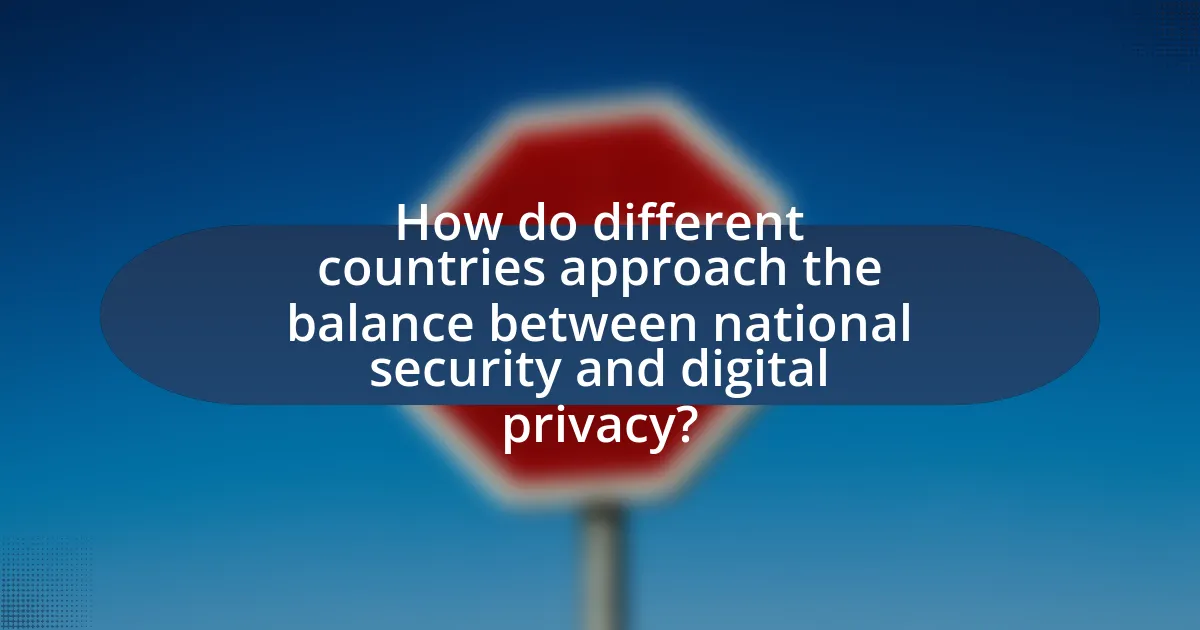
How do different countries approach the balance between national security and digital privacy?
Different countries adopt varied approaches to balancing national security and digital privacy, often influenced by their legal frameworks, cultural values, and historical contexts. For instance, the United States prioritizes national security through legislation like the USA PATRIOT Act, which allows extensive surveillance capabilities, often at the expense of individual privacy rights. In contrast, the European Union emphasizes digital privacy, exemplified by the General Data Protection Regulation (GDPR), which imposes strict rules on data handling and prioritizes user consent, even when national security is at stake. Countries like China implement a model that heavily favors state control and surveillance, often justifying extensive monitoring as necessary for national security, thereby significantly limiting personal privacy. These approaches illustrate the complex interplay between ensuring security and protecting individual rights, with each country navigating this balance according to its unique priorities and societal norms.
What are the varying legal frameworks governing digital privacy worldwide?
The varying legal frameworks governing digital privacy worldwide include the General Data Protection Regulation (GDPR) in the European Union, the California Consumer Privacy Act (CCPA) in the United States, and the Personal Information Protection and Electronic Documents Act (PIPEDA) in Canada. The GDPR, enacted in 2018, establishes strict guidelines for data protection and privacy for individuals within the EU, emphasizing user consent and data portability. The CCPA, effective from 2020, grants California residents rights regarding their personal information, including the right to know what data is collected and the right to delete it. PIPEDA, implemented in 2000, regulates how private sector organizations collect, use, and disclose personal information in the course of commercial activities in Canada. These frameworks reflect diverse approaches to digital privacy, influenced by cultural, legal, and economic factors in their respective regions.
How do these frameworks reflect cultural attitudes towards privacy?
These frameworks reflect cultural attitudes towards privacy by illustrating the varying degrees of value placed on individual privacy versus collective security. For instance, in countries like Germany, stringent data protection laws stem from historical experiences with surveillance, indicating a strong cultural emphasis on personal privacy. Conversely, in the United States, frameworks such as the USA PATRIOT Act demonstrate a cultural inclination towards prioritizing national security, often at the expense of privacy rights. This divergence highlights how cultural contexts shape legal approaches to privacy, with specific laws and regulations emerging as responses to societal values and historical events.
What role do international agreements play in shaping these laws?
International agreements play a crucial role in shaping laws related to national security and digital privacy rights by establishing common standards and frameworks that countries are encouraged to adopt. These agreements, such as the General Data Protection Regulation (GDPR) in the European Union, set guidelines for data protection and privacy that influence national legislation. For instance, the GDPR has prompted countries worldwide to enhance their privacy laws to align with international expectations, thereby fostering a global standard for digital privacy. Additionally, treaties like the Budapest Convention on Cybercrime facilitate international cooperation in addressing cyber threats while balancing the need for privacy, demonstrating how such agreements can guide national policies in a way that considers both security and individual rights.
How do specific case studies illustrate the balance between security and privacy?
Specific case studies, such as the Apple vs. FBI case in 2016, illustrate the balance between security and privacy by highlighting the tension between law enforcement needs and individual rights. In this case, the FBI sought Apple’s assistance to unlock an iPhone used by a terrorist, arguing that access was crucial for national security. Apple refused, citing user privacy and the potential risks of creating a backdoor that could compromise the security of all its devices. This case exemplifies the ongoing debate where security measures can infringe on personal privacy, demonstrating that achieving a balance requires careful consideration of both public safety and individual rights. The outcome, where the FBI ultimately found an alternative method to access the phone, underscores the complexity of this balance and the need for ongoing dialogue and policy development in the realm of digital privacy rights.
What lessons can be learned from countries with strict surveillance laws?
Countries with strict surveillance laws demonstrate that while national security can be enhanced, it often comes at the cost of individual privacy rights. For instance, in China, extensive surveillance measures have been implemented under the guise of security, leading to significant public concern over personal freedoms and human rights violations. This situation illustrates that excessive surveillance can erode trust between citizens and the government, as seen in the widespread dissent against such practices. Furthermore, the experiences of countries like the United Kingdom, which employs mass surveillance through programs like the Investigatory Powers Act, highlight the potential for abuse of power and the need for robust legal frameworks to protect citizens’ rights. These examples underscore the importance of finding a balance between security needs and the preservation of privacy, emphasizing that transparency and accountability are crucial in any surveillance strategy.
How have privacy rights evolved in response to security threats in different regions?
Privacy rights have evolved significantly in response to security threats across various regions, often leading to a tension between individual freedoms and national security measures. In the United States, the post-9/11 era saw the implementation of the USA PATRIOT Act, which expanded government surveillance capabilities, thereby limiting certain privacy rights in the name of national security. Conversely, the European Union has emphasized strong privacy protections, exemplified by the General Data Protection Regulation (GDPR), which was enacted in 2018 to safeguard personal data even amid security concerns.
In regions like Asia, countries such as China have adopted stringent surveillance measures under the guise of security, often at the expense of privacy rights, while Japan has taken a more balanced approach by enacting laws that protect personal information while still addressing security needs. These regional differences illustrate how privacy rights are shaped by local security threats and governmental responses, reflecting a complex interplay between protecting citizens and ensuring their privacy.
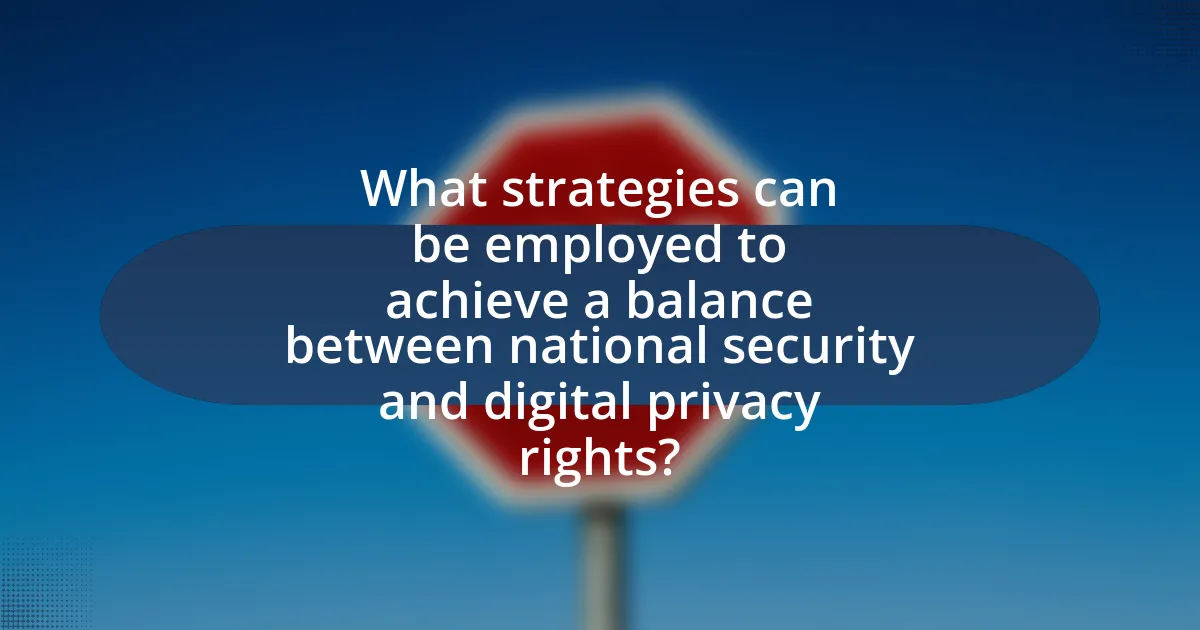
What strategies can be employed to achieve a balance between national security and digital privacy rights?
To achieve a balance between national security and digital privacy rights, strategies such as implementing robust data protection laws, enhancing transparency in surveillance practices, and fostering public dialogue on privacy concerns can be employed. Robust data protection laws, like the General Data Protection Regulation (GDPR) in Europe, establish clear guidelines on data usage and individual rights, ensuring that personal information is safeguarded while allowing necessary security measures. Enhancing transparency in surveillance practices, as seen in the USA Freedom Act, can help build public trust by informing citizens about the extent and purpose of data collection. Additionally, fostering public dialogue encourages collaboration between government entities, technology companies, and civil society, allowing for a more nuanced understanding of privacy rights and security needs. These strategies collectively contribute to a framework that respects individual privacy while addressing national security imperatives.
How can technology enhance both security and privacy?
Technology can enhance both security and privacy through advanced encryption methods and secure communication protocols. Encryption protects sensitive data by converting it into a format that unauthorized users cannot access, thereby ensuring confidentiality. For instance, end-to-end encryption used in messaging applications like Signal and WhatsApp ensures that only the communicating users can read the messages, preventing interception by third parties. Additionally, secure communication protocols, such as HTTPS, protect data transmitted over the internet, safeguarding it from eavesdropping and tampering. According to a 2021 report by the International Telecommunication Union, implementing robust encryption standards can significantly reduce the risk of data breaches, thereby enhancing both security and privacy for users.
What innovations are being developed to protect privacy while ensuring security?
Innovations being developed to protect privacy while ensuring security include advanced encryption techniques, privacy-preserving machine learning, and decentralized identity systems. Advanced encryption techniques, such as homomorphic encryption, allow data to be processed without exposing the underlying information, thus maintaining privacy while enabling secure computations. Privacy-preserving machine learning methods, like federated learning, enable models to be trained on decentralized data without transferring sensitive information to a central server, thereby enhancing privacy. Decentralized identity systems leverage blockchain technology to give individuals control over their personal data, allowing secure verification without compromising privacy. These innovations are crucial in addressing the challenges of balancing national security and digital privacy rights, as they provide mechanisms to safeguard personal information while still enabling necessary security measures.
How can encryption play a role in this balance?
Encryption enhances the balance between national security and digital privacy rights by safeguarding sensitive information from unauthorized access while allowing law enforcement to access data when legally justified. It protects personal communications and data, ensuring that individuals maintain their privacy rights, which is essential in a democratic society. For instance, the use of end-to-end encryption in messaging applications prevents third parties, including government entities, from intercepting private conversations, thereby upholding privacy. However, this same encryption can complicate national security efforts, as it may hinder law enforcement’s ability to investigate criminal activities. The challenge lies in finding a solution that allows for lawful access to encrypted data without compromising the fundamental right to privacy, as highlighted by debates surrounding the “going dark” phenomenon, where law enforcement struggles to access encrypted communications in criminal investigations.
What best practices can governments adopt to respect digital privacy rights?
Governments can adopt several best practices to respect digital privacy rights, including implementing strong data protection laws, ensuring transparency in data collection, and promoting user consent. Strong data protection laws, such as the General Data Protection Regulation (GDPR) in the European Union, establish clear guidelines for data handling and empower individuals with rights over their personal information. Transparency in data collection involves informing citizens about what data is collected, how it is used, and who it is shared with, fostering trust and accountability. Promoting user consent requires that individuals have the ability to opt-in or opt-out of data collection processes, ensuring that their privacy preferences are respected. These practices collectively contribute to a framework that balances national security needs with the protection of individual privacy rights.
How can transparency and accountability improve public trust?
Transparency and accountability enhance public trust by fostering an environment of openness and responsibility in governance. When government actions and decisions are transparent, citizens can better understand the rationale behind policies, which reduces suspicion and promotes confidence. For instance, a study by the World Bank found that countries with higher levels of transparency in public administration experience greater citizen trust and engagement, as transparency allows for informed public discourse and participation. Additionally, accountability mechanisms, such as audits and public reporting, ensure that officials are held responsible for their actions, further reinforcing trust. This relationship between transparency, accountability, and public trust is critical, especially in contexts where national security measures may impact digital privacy rights, as citizens are more likely to support policies when they believe their government is acting in their best interest with integrity.
What role do civil society organizations play in advocating for privacy rights?
Civil society organizations play a crucial role in advocating for privacy rights by raising awareness, influencing policy, and holding governments accountable. These organizations, such as the Electronic Frontier Foundation and Privacy International, engage in public campaigns to educate citizens about their privacy rights and the implications of surveillance. They also participate in legislative processes, providing expert testimony and recommendations to shape laws that protect individual privacy. Furthermore, civil society organizations often litigate against government actions that infringe on privacy rights, as seen in cases challenging mass surveillance practices. Their efforts contribute to a more informed public discourse on privacy issues, ultimately fostering a legal environment that prioritizes individual rights over unchecked state power.
What are practical steps individuals can take to protect their digital privacy?
Individuals can protect their digital privacy by implementing strong password practices, using two-factor authentication, and employing encryption tools. Strong passwords, which include a mix of letters, numbers, and symbols, reduce the risk of unauthorized access; studies show that 81% of data breaches are due to weak passwords. Two-factor authentication adds an extra layer of security, making it harder for attackers to gain access even if they have the password. Additionally, using encryption tools for emails and files ensures that sensitive information remains confidential, as encryption can prevent unauthorized access during data transmission. Regularly updating software and being cautious about sharing personal information online further enhances digital privacy.
